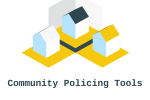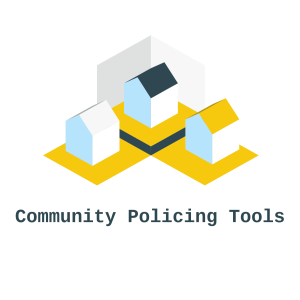At BigTB, our mission is to democratize access to information and technology. To put it another way, we view technology as critical to the progress of society and are a catalyst for progress when we help take leading edge technologies and apply them to areas that generally lag behind. We couldn’t find a better example of technology lagging behind than government, and with that in mind, I’m pleased to announce the addition of Robert Hollingsworth to our team. Rob is a Navy veteran and a former police officer with a decade of public service. He brings a passion for accountability and progress that we believe is critical to improving the standard of safety for citizens everywhere.
Over the last few years we have seen a breakdown in safety across the country. The most notable events include the 2020 riots, but it runs much deeper than that. Many departments are facing staffing shortages and budget cuts. Personally, one of the data points I have found the most interesting about the current situation is how often a police department may even have budget for new staff, but have difficulty finding applicants. So what is to be done?
BigTB is rolling out a set of community policing tools that help facilitate a stronger bond between the community and law enforcement through improving communication, transparency, and accountability. I’ll elaborate in detail:
First, what are the problems facing departments? If you really take a look at the big picture, a few key areas are real resource pits. Two of the best examples of that would be traffic incidents and noise complaints. It can take hours for a police officer to arive at the scene of an accident, and meanwhile, the citizens are waiting in the middle of the road while further impeding traffic. What about noise complaints? Given the tremendous volume of calls to respond to, virtually all noise complaints are dismissed without further action. So what happens when you don’t respond to noise complaints? Things can frequently escalate.
In an Office of Justice Programs report (https://www.ojp.gov/pdffiles1/nij/grants/251140.pdf) it was noted that in general, Law Enforcement Agencies do not have a strong association between their policing strategy and technology. Well, that’s what brings us here. This is in spite of the 2015 21st century policing task force completed by then president, Obama.
The Community Policing Tools that BigTB provides law enforcement leverage technology in a way to seemlessly connect community with law enforcement. You might think, “wouldn’t that mean more work for the officers”? Great question, and surprisingly, no! I’ll give you some examples of how BigTB technologies can be used to radically reduce workload for street cops, improve the quality of detective work, and help community members be able to have their complaints taken more effectively, all while reducing the overall workload of the Agencies that use us.
First, let’s take a look at noise complaints. Many departments have policies that state that officers do not respond to noise complaints. This is due to staffing and call volume. So what happens next? Citizens keep calling, confidence in law enforcement drops, and things don’t get better. But this isn’t just with noise complaints, it is with porch pirates, stolen bikes, all sorts of other “small crime”. How would this be different with BigTB Community Policing Tools, the whole equation changes. When a noise complaint happens, members of the community can submit the complaint online. The complaint can include pictures, videos, all sorts of other details. Because the complaint is taken online, it frees up dispatcher time. The citizen also is able to immediately provide information to the officers, without having to have an officer respond. Most of the time, if it is a single noise complaint, there really isn’t anything to be done, but it is logged and the citizen feels better. Administration can review reports as they come in and have real data on what the noise complaints (and other types of crime reported) look like.
It is a similar formula with a traffic incident. Most citizens feel the need to “not disturb the crime scene”, but what they are really doing is impeding traffic and waiting for something to happen that won’t. With BigTB Community Policing Tools, citizens can submit a traffic incident report online, exchange information, or submit any other information the police department would like, and then be on their way. This helps slow down on traffic jams, prevent secondary accidents, and helps reduce the workload for patrol officers. Further, this allows for fully transparent and accountable reporting. Citizens swear under penalty of perjury that the statements they are making are true and accurate.
Alright, so noise complaints and traffic incidents, that’s all well and good, but what does impact do the BigTB Community Policing Tools have on major crime? A real game changer. But don’t take my word for it, let’s go through some examples:
Let’s say you are a patrol officer responding to a claim of theft. You arrive to take the report, and what happens? The victim tells you that they don’t know the suspects real name but they know their social media profile is CowboysFan75 and they stole their bike. To make matters worse, this is not the first time you’ve heard of this “CowboysFan75”. Once you take down the information for the report, you input it into the BigTB Community Policing Tools. From there, you can search for “CowboysFan75” or any variation of it, then you will see reports of any other complaints made about that same username. In fact, maybe when you run that search you find out that one of your fellow officers had a similar case, and was able to identify CowboysFan75 by name. Since they wanted to help build intelligence that can solve crimes, they placed that information in a report about a completely separate incident. So now, without even leaving the scene, you have more information to go on. When you submit the information from your report it becomes immediately accessible to every other member of your department. It isn’t just social media handles, it can be serial numbers for weapons, license plates, phone numbers, emails, all sorts of things. Now every time you submit a report to your agency, it becomes part of the cloud of knowledge that is available to every officer. You are now part of a real-time information gathering and processing cloud.
Let’s go back to the 2020 riots. It isn’t uncommon for there to be a massive event that requires significant resources to process. With lots of information coming in rapidly, now you’re able to search by tattoos and real details that can help you piece together a developing riot, in real-time. Every officer is now a part of that ongoing investigation without needing to run it through centralized command and information structures or rely on federal agencies to investigate with greater resources. What would make it better? The Community Reporting Tool.
The Community Reporting Tool is a truly revolutionary approach towards community involvement. BigTB Community Policing Tools provide a way for members of the community to submit tips and make reports in a new way. First, it allows victims of crime to submit a report online without needing to have an officer respond and wait to hear the abbreviated version of what happened. Victims can submit photos, videos, and chat logs. Victims also can update their complaint in real-time as new information becomes available. With the ever increasing scrutiny of police departments, wouldn’t it be nice to have real time pictures of suspects on the officers computer prior to their arrival? Citizens can upload photos to the platform which can be sent directly to the responding officer(s).
Another great aspect of this system is it allows for individuals who may fear retaliation from police or others, to truly anonymously submit tips and evidence. Because the tool truly allows for anonymous information to be submitted, video evidence of crimes can be offered to detectives without the same concerns. This would be incredibly helpful in compiling video footage from events with great amounts of people. Additionally, users can share their information. Many community members may wish to register with the tool so this way they can effectively “build credibility” with the department. What makes this even better is that these reports can be fed to the BigTB Community Policing Tools cloud that is then available in real-time to all officers with appropriate access.
Are BigTB’s community policing tools right for your agency? Contact Rob, our Director of Community Policing Tools to find out. Again, big thanks to Rob for joining our team. We are passionate about democratizing access to information and technology; we expect great things out of our Community Policing Tools Department.

